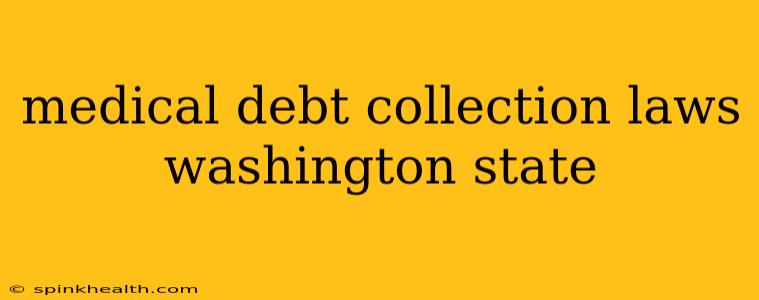The sting of unexpected medical bills can be overwhelming, especially when they lead to debt collection. Washington State, like many others, has laws designed to protect consumers from abusive debt collection practices, but understanding these laws is crucial to protecting your rights. This isn't just about numbers on a bill; it's about your financial well-being and peace of mind. Let's unravel the complexities of medical debt collection laws in Washington.
What are the main laws governing medical debt collection in Washington State?
Washington's laws regarding debt collection are largely governed by the Fair Debt Collection Practices Act (FDCPA), a federal law, and the Washington Collection Agency Act (WCAA). The FDCPA sets national standards, prohibiting harassment and deception by debt collectors. The WCAA provides additional state-specific protections and regulations for Washington residents. These laws work together to create a framework aimed at fair and ethical debt collection practices. This means collectors can't use threats, harassment, or deceptive tactics to get their money.
What constitutes harassment by a debt collector in Washington?
This is a critical point. Harassment isn't limited to outright threats. Under both the FDCPA and WCAA, harassment includes:
- Repeated calls at inconvenient times: This could mean calling before 8 a.m. or after 9 p.m., or repeatedly calling throughout the day.
- Calling your employer: Debt collectors generally can't contact your workplace, unless it's to confirm your employment information.
- Using abusive or threatening language: This encompasses threats of violence, arrest, or other forms of intimidation.
- False or misleading statements: Collectors cannot falsely claim they are lawyers or government officials. They can't misrepresent the amount you owe or the consequences of non-payment.
If you feel you're being harassed, document every contact: date, time, who called, and a summary of what was said. This documentation is crucial if you need to file a complaint.
What if a debt collector is trying to collect a debt I don't owe?
This situation requires immediate action. You have the right to dispute the debt, and the collector must investigate your claim. Under the FDCPA and WCAA, they must cease collection efforts while investigating. Your dispute should be in writing, including details about why you believe the debt is invalid. Keep a copy for your records. You might also consider consulting with a consumer credit counselor or attorney for advice.
Can a debt collector contact me at my workplace in Washington?
Generally, no. The FDCPA and WCAA restrict contact with your employer, except to confirm your employment information. If a collector contacts your workplace for any other reason, it's a violation of your rights. Again, diligent record-keeping is essential.
What are my rights if I'm being contacted by a medical debt collector in Washington?
Your rights are extensive. Remember:
- The right to dispute the debt: If you believe the debt is inaccurate, you can dispute it in writing.
- The right to verification of the debt: The collector must provide you with verification of the debt, including the amount owed, the creditor, and the account details.
- The right to request validation of the debt: You have a right to ask for proof that the debt is legally valid and belongs to you.
- The right to be free from harassment: Debt collectors cannot use abusive, threatening, or deceptive tactics.
Where can I find more information about my rights regarding medical debt collection?
The Washington State Attorney General's Office is a valuable resource for information about consumer protection laws, including debt collection. Their website offers resources, guides, and complaint procedures. The Consumer Financial Protection Bureau (CFPB) also provides information on federal consumer protection laws like the FDCPA.
This information is for educational purposes only and not legal advice. If you have specific questions or concerns about your medical debt, consult with a legal professional. Knowing your rights is your first step towards navigating the complexities of medical debt collection in Washington State. Remember, you're not alone, and there are resources available to help you.

